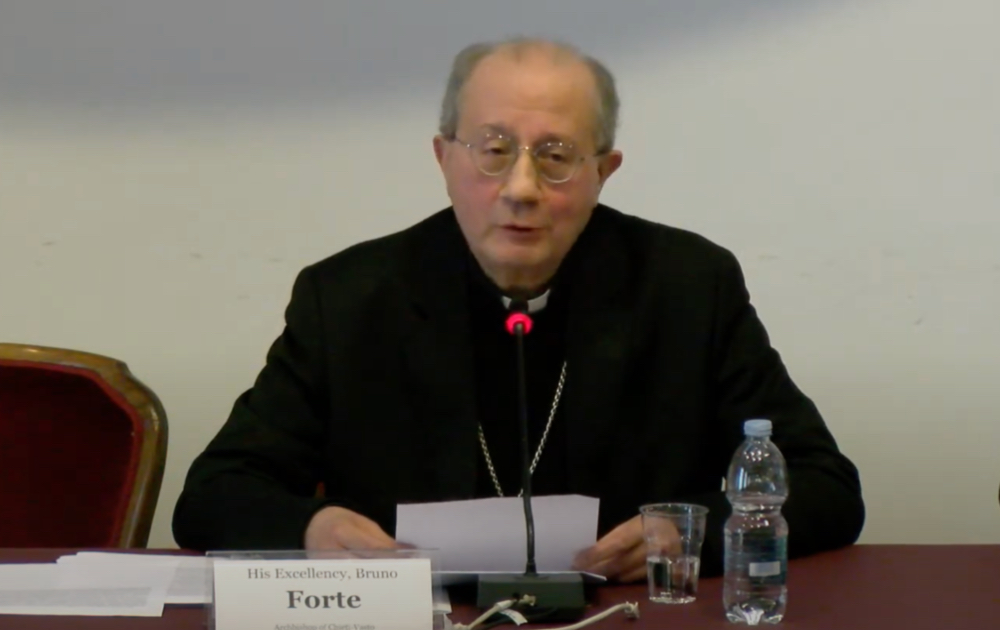
CHIETI, Italy (LifeSiteNews) — According to a report from the Italian blog Messainlatino, Archbishop Bruno Forte of the Archdiocese of Chieti-Vasto, Italy, has instructed his priests not to distribute Holy Communion on the tongue or place holy water in the fonts of churches.
On May 11, Messainlatino reported that, “In a statement of April 20, 2023 signed by Mgr. Fabio Iarlori, Episcopal Vicar for Religious and Referent of the Priestly Area (liturgy and sacraments) of the Archdiocese of Chieti-Vasto, and sent to the priests by message on the mobile phone, it was stated that ‘in an update to the current anti Covid regulations, the Archbishop considers it appropriate that due to the current situation, the following practices continue to be maintained in our Archdiocese:
— Eucharistic communion is to be distributed exclusively on the hands;
— Do not place holy water in holy water fonts.
Messainlatino stated that in order to verify the news upon hearing it, since the instruction was not published on the website of the archdiocese, “confirmation was requested by email directly to the Archbishop’s Secretariat, who replied: ‘We confirm that the statement corresponds to the truth and that it was forwarded to all priests a few weeks ago at the behest of our Archbishop’.
On May 5, the World Health Organization (WHO) announced that Covid-19 “no longer constitutes a public health emergency of international concern.” After the declaration, the president of the Italian Episcopal Conference on May 8 issued a letter to all bishops in Italy stating that “all ecclesial activities, liturgical, pious devotions, can return to be lived in the usual ways prior to the health emergency.”
Already last year, Communion on the tongue was allowed again in the “guidelines” of the bishops’ conference before Holy Week 2022. Archbishop Forte has therefore maintained his restrictions with seemingly little justification from either medical or ecclesiastical bodies.
RELATED: Italian bishops permit Communion on the tongue but keep masks mandatory for Holy Week
Messainlatino lamented the fact that due to these measures that are “unnecessarily and unreasonably … restrictive for the faithful,” Catholics “are still prevented from being able to approach the Holy Eucharist in the manner they consider closest to their sensitivity and to use the holy water font.”
LifeSiteNews was able to verify locally that the archbishop’s restrictions are not ruthlessly and universally implemented everywhere, with some churches maintaining holy water in the fonts at their entrance and distributing Holy Communion on the tongue without issue to the faithful who desire it. It would appear that the pastoral sensitivity of priests perhaps prevents them from refusing Holy Communion from the faithful who wish to receive Christ’s Body with greater reverence in the manner of reception that was mandated universally in the Church for many centuries.
Messainlatino expressed the hope “that the Archbishop will soon be able to review his decision … and put an end to this harassment, for the good of his faithful and with a view to authentic ‘inclusion’ towards all legitimate sensitivities.”
Such refusal to give Communion on the tongue to a baptized Catholic runs contrary to the Church’s universal law concerning the reception of Holy Communion by the lay faithful. The General Instruction of the Roman Missal states:
The consecrated host may be received either on the tongue or in the hand, at the discretion of each communicant. (n.160)
If Communion is given only under the species of bread, the priest raises the host slightly and shows it to each, saying, Corpus Christi (The Body of Christ). The communicant replies, Amen, and receives the Sacrament either on the tongue or, where this is allowed and if the communicant so chooses, in the hand. (n.161)
Likewise, the Code of Canon Law, which binds all bishops and priests in the Roman Rite, legislates the following:
Sacred ministers cannot deny the sacraments to those who seek them at appropriate times, are properly disposed, and are not prohibited by law from receiving them. (Can. 843 §1.)
Any baptized person not prohibited by law can and must be admitted to holy communion. (Can. 912)
The document Redemptionis Sacramentum, issued by the Congregation for Divine Worship and the Discipline of the Sacraments, also addressed the matter, reaffirming the Church’s universal law permitting Communion on the tongue at any time. The section on the distribution of Holy Communion in Chapter 4 of the document reads:
In distributing Holy Communion it is to be remembered that “sacred ministers may not deny the sacraments to those who seek them in a reasonable manner, are rightly disposed, and are not prohibited by law from receiving them”. Hence any baptized Catholic who is not prevented by law must be admitted to Holy Communion. Therefore, it is not licit to deny Holy Communion to any of Christ’s faithful solely on the grounds, for example, that the person wishes to receive the Eucharist kneeling or standing. (n.91)
Each of the faithful always has the right to receive Holy Communion on the tongue, at his choice. (n.92)
Cardinal Francis Arinze affirmed the sacramental rights of the faithful in an interview with Church Militant in May 2020, stating, “No priest has the right to demand that, and even no bishop has the right to demand you must receive on the hand.”
Bans on Communion on the tongue also stand in contradiction with the statements of medical doctors in various countries, who advised at the start of the Covid pandemic that Communion on the tongue was safer than on the hand.
According to a press release in September 2020, 27 medical doctors wrote to the German bishops that there were “no medical reasons for a ban of Communion on the tongue.” Earlier that year, 21 doctors in Austria supported the professional opinion of Professor Filippo Maria Boscia that “Communion on the tongue is safer than hand Communion.” Boscia is the president of the Association of Catholic Doctors of Italy. This was echoed by doctors in Poland as well.

